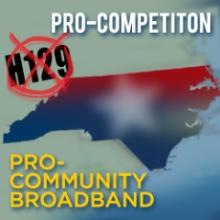
As the North Carolina Legislature considers HB129 and S87 to greatly limit community broadband networks (we analyzed the bill here), it is worth taking a step back to understand why companies like Time Warner Cable provide broadband that is unreliable and comparatively both slow and costly without having other companies come in to offer a better product. The problem is basic economics: the problem of natural monopoly. Ever wonder why you generally don't have a choice between two major operators like Comcast and Time Warner Cable? They have carved up the market due to the costs and difficulty of directly competing with one another. Some folks have a choice of cable companies -- RCN and Knology, for instance, have been successful overbuilders in a few regions (though they went through troubles far worse than most public networks that have been termed "failures"). But for the most part, overbuilding an incumbent cable company is all but impossible -- especially for a private sector company looking for a solid return on investment inside a few years. In the face of a new cable entrant, massive companies like TWC start lowering prices, offering cash or other enticements, and lock both residents and businesses into contracts to deny the entrant any subscribers. Companies like TWC can do this because they have lower costs (through volume discounts for gear, content, and even marketing synergies as well as because they long ago amortized the network construction costs) and can take losses in one community that are cross-subsidized by profits from non-competitive areas. New entrants, both private and public, have higher costs as well as a learning curve.
This is why we have so little broadband competition. Without competition, the few providers we have invest less and charge more, which is other countries are rapidly surpassing us (not because we have large rural areas, nonetheless a popular straw man). In the face of this reality, communities have built their own networks for a variety of benefits, including creating competition or changing the dynamic of a duopolistic "market." Massive incumbent providers responded by claiming competition from communities was unfair and using their lobbying power to pass bills in many state legislatures to preempt local authority to build this necessary infrastructure. For years, North Carolina has dealt with these arguments but the recent election has convinced TWC lobbyists that 2011 is their year to finally get rid of community networks -- the only real threat of competition they face.
The Legislature, ignoring the fact that community fiber networks offer the best broadband in the state, appears poised to deliver a de facto monopoly to TWC. Stop the Cap! debunked TWC's claims here. Fortunately, a flood of phone calls to Legislators has slowed the process and may result in a less one-sided bill. Unfortunately, the promised negotiations may not be in good faith. In the House, the Committee on Public Utilities will discuss this bill on Wednesday, March 2, 2011 at Noon in 643 LOB. Please continue encouraging people in NC to call-in on this bill -- Stop the Cap! has all the contact information you need. Encourage your local leaders and organizations to pass resolutions calling for no new barriers to community networks -- you can use language from this petition, which you should sign also! If you have any such resolutions, let us know and we'll publicize them as well as pass them on to those locally working on the issue. It is worth recalling an interview Brian Bowman did about Greenlight in Wilson, NC.
 And finally, for those who want to really go deep into some of the ways this bill protects existing private incumbents at the expense of competition, the North Carolina League of Municipalites has studied the bill and created an enlightening chart.
And finally, for those who want to really go deep into some of the ways this bill protects existing private incumbents at the expense of competition, the North Carolina League of Municipalites has studied the bill and created an enlightening chart.
| ISSUE | MUNICIPAL BROADBAND SYSTEMS | PRIVATELY OWNED CABLE SYSTEMS |
|---|---|---|
| Cable & Broadband Rates | Municipal systems would be subject to strict State rate regulation in violation of federal law prohibiting State rate regulation. | Private cable operators generally exempt from rate regulation under federal law |
| Prices for would be set & regulated by N.C. Utilities Commission. | Municipal providers would be prohibited from offering promotions to customers or setting prices below the cost of service. | |
| Prices could be artificially inflated due to 1) an effective prohibition on achieving economies of scale through the use of equipment & facilities for multiple public purposes; 2) mandatory inclusion of artificial costs in subscriber rates that have not actually been incurred; and 3) mandatory compliance with numerous regulatory requirements. | Cities and towns would be prohibited from financing any broadband operations from any other internal financial resource or from transferring funds from one activity to another (e.g. smart grid). | |
| Prices unconstrained and unregulated | Private cable operators can engage in predatory pricing by charging prices below cost in markets served by municipal providers & offering promotions such as cash rebates to keep customers from switching to municipal systems or to lure back municipal customers. | |
| Prices not subject to any of the new rules that would apply to municipal providers, thereby allowing 1) use of equipment & facilities for multiple business purposes; 2) unlimited rates, making possible the lowering of rates in competitive markets by increasing prices in noncompetitive markets; and 3) no obligation to comply with any new regulatory requirements that apply to municipal providers. | Most private cable companies are large national companies and can self-finance without limit (e.g., by transferring funds from one business activity to another or from one geographic region to another.) | |
| Public Safety Networks | Operation of public safety networks for which public users share costs by paying fees would be subject to the same complex and strict regulations as apply to other municipal broadband systems. | Private cable companies would be unaffected because they have no public safety obligations and generally do not operate public safety networks. |
| Federal and State Funds | Cities and towns would be prohibited from using federal and state funds to develop or operate broadband systems, public safety networks operated on a cost-sharing basis or other. | Private cable companies could receive federal and state grants to expand their systems. |
| Oversight | Subject to N.C. Utilities Commission regulation with a lengthy public hearing process before initiating service. | Private cable operators not regulated by N.C. Utilities Commission. |
| Required to publish independent annual audits, which would be available to competitors. | Not required to publish audits or otherwise disclose information about finances to their competitors. | |
| Sharing Facilities with Competitors | Required to allow competitors to use owned or leased transmission facilities and capacity on same terms as municipality (e.g. free). | Private cable operators are not required to share. |
| Financing | May not use common financing arrangements such as lease-purchase or security interest to secure financing. | No restrictions on financing instruments. |
| Local Government Commission must determine whether business plan is feasible before going to market for debt. | Debt purchasers assess the feasibility of business plans and the market determines whether debt can be issued at a viable cost to the provider. | |
| Service Area | Limited to within municipal boundaries, even if an outside customer (business) requests the service. Within boundaries, higher costs are required to provide service unless an area is unserved by internet access, but if 89% of households don’t have 768Kb/s still considered “served” Private cable operators need only declare their intent to serve an area in order to receive a franchise for that area. | Private cable operators need only declare their intent to serve an area in order to receive a |
| Exposure to Legal Liability & Lawsuits | More possible lawsuits because “aggrieved party” could sue any municipal provider. Vague definitions in law make lawsuits more likely. | Deregulation of cable industry has limited the availability of meaningful remedies. |
| Grandfathering | No municipal broadband operations are grandfathered from all requirements. Existing operations will face costs due to the bill that were not in their business plans. | Not subject to bill requirements and given new rights to sue existing municipal competitors. |







